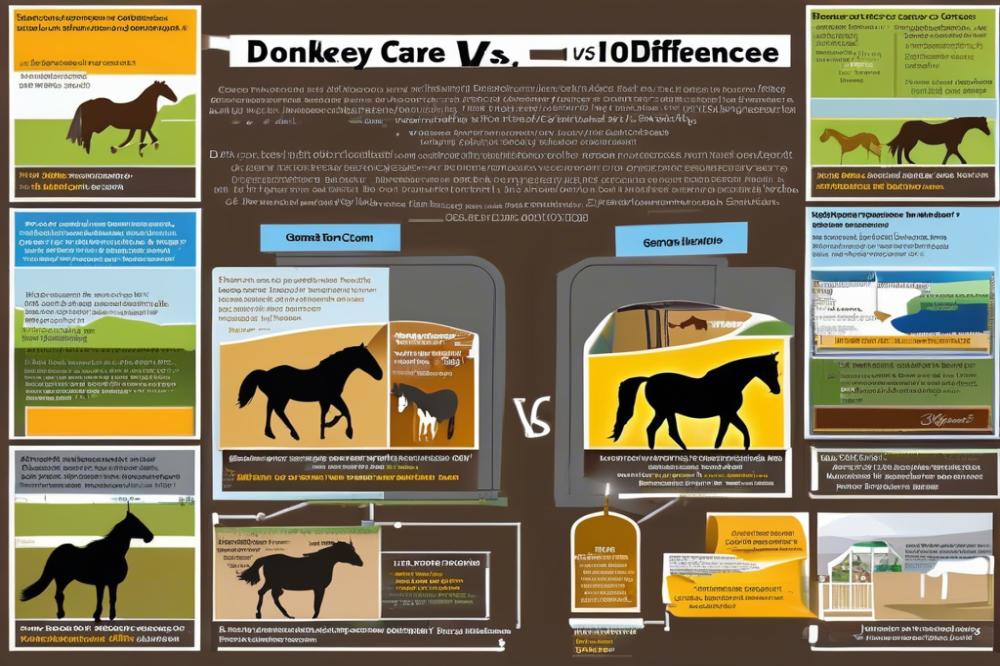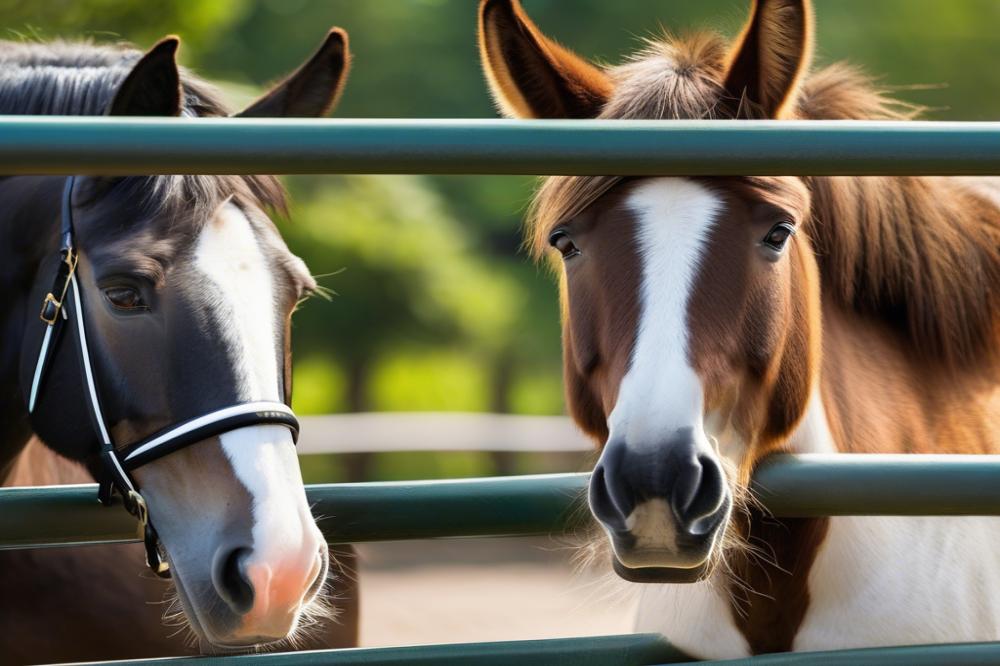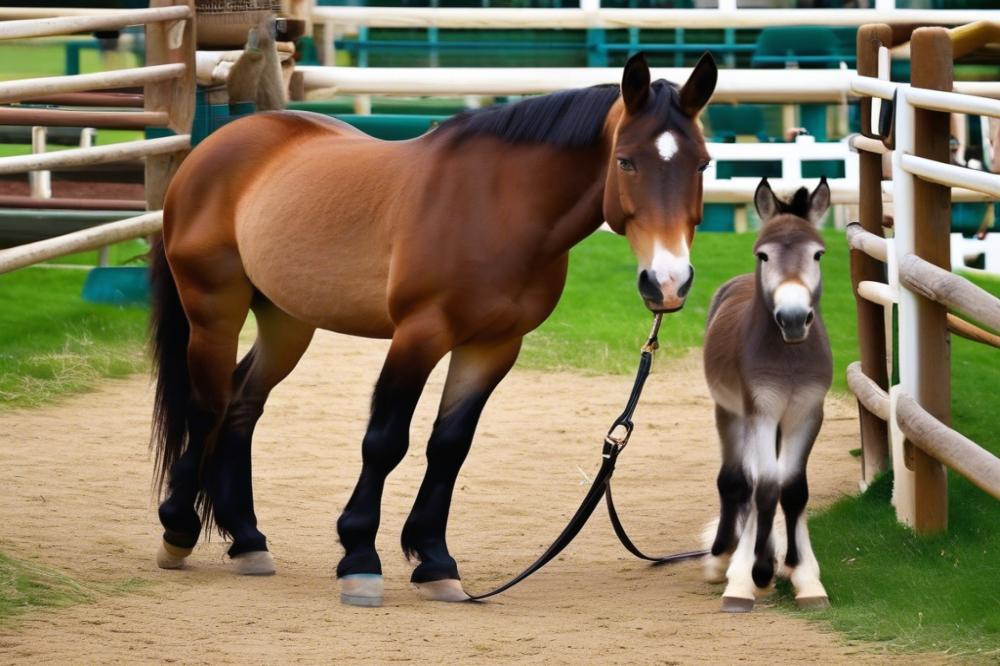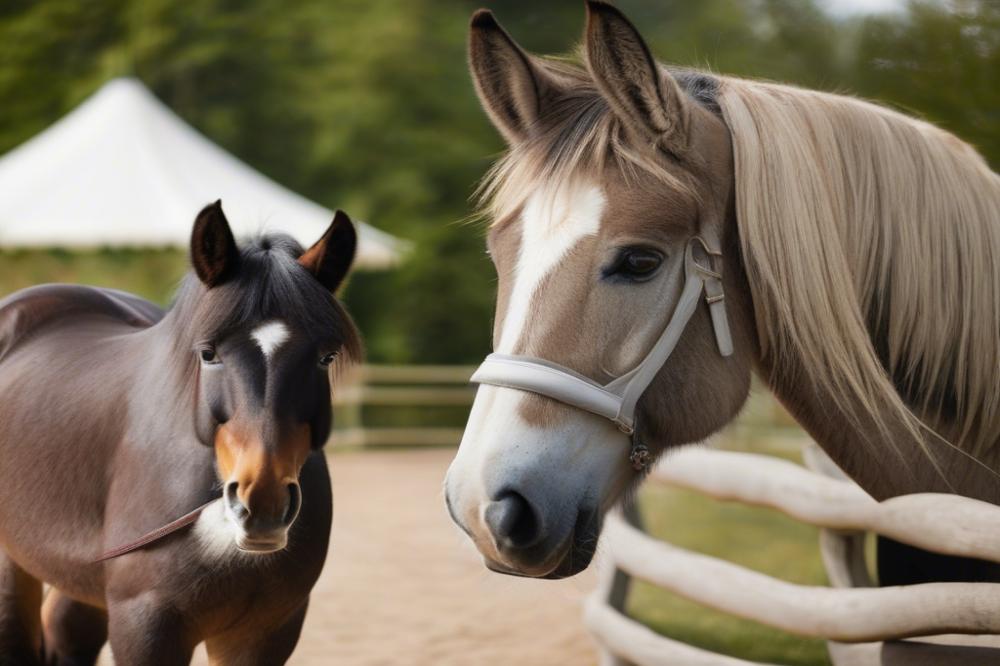Understanding Donkeys and Horses
When we think about caring for animals, it’s easy to lump all equines together. However, donkey care and horse care each have their own set of needs and considerations. Donkeys and horses might share some similarities, but they come from different backgrounds and present distinct characteristics of their own. It’s like comparing apples to oranges; both are fruits, but you wouldn’t use them interchangeably in a pie recipe!
Take a moment to consider the donkey. These sturdy creatures have unique donkey characteristics, such as a more cautious nature and a strong sense of self-preservation. On the other hand, horses typically display a spirited demeanor and a more social character. Their horse characteristics often lead them to thrive in active environments where they can engage with humans and other horses. Knowing these differences is crucial for anyone looking to provide proper care.
For owners and caretakers, understanding what sets donkey care apart from horse care is vital. Each animal requires tailored feeding, grooming, and exercise routines to keep them healthy and happy. Many well-meaning caregivers might think they can apply the same principles to both, but this can lead to complications. Just imagine trying to bake a cake without knowing the right ingredients—things might not rise to the occasion!
Not only do donkeys and horses have different dietary needs, but their exercise and socialization requirements also differ significantly. Donkeys aren’t as high-energy as some breeds of horses, so their exercise sessions might resemble a leisurely stroll rather than a heart-pounding gallop. Skipping this knowledge can leave one scratching their head like a confused dog. It’s as if someone thought, “is polo a cruel sport?” The answer depends on the understanding and care put into each individual horse.
Ultimately, knowing how to care for these wonderful animals means embracing their unique traits. Taking the time to learn the differences can make the journey of equine care more rewarding and fulfilling for both the caretaker and the animal. Just as a teacher molds a student, a great owner molds a relationship with their donkey or horse!
Physical Characteristics

Comparison of Size and Build Between Donkeys and Horses
Donkeys and horses differ quite a bit in size and shape. A horse often towers over a donkey, standing anywhere from 14 to 17 hands high or even taller. In contrast, most donkeys are under 14 hands. Their builds also vary; horses tend to have long, slender limbs while donkeys possess a stockier, sturdier frame. This difference in stature reflects how each animal is suited for different types of work. Horses have a reputation for speed and agility. Donkeys, on the other hand, are known for their strength and endurance.
Differences in Hoof Structure and Health Maintenance
Hooves reveal a lot about animal care practices for both species. Donkeys have smaller, more rounded hooves that are designed to support their weight over rocky terrain. This feature makes hoof care essential, especially if your donkey is on softer ground too often. Horse hooves are larger and may need shoes for added protection, especially if they participate in sports. Regular trimming and checking for problems are crucial for both donkeys and horses, but it’s not a one-size-fits-all solution. You wouldn’t want to let a hoof issue slide; it can lead to serious complications.
Variations in Coat Types and Grooming Needs
Coats show just as much difference as size or hooves. Horse coats can be sleek or fluffy, depending on the breed and season. When winter comes, many horses develop thick fur, which requires regular grooming. Donkeys often have a coarser coat and shorter hair. They don’t need as much grooming, but brushing them occasionally helps keep their skin healthy. Ever seen a horse at a show? Their shiny coats sure impress! Donkeys may not strut their stuff in the same way, but they still want attention. Brushing not only helps with dirt but also forms a bond.
Understanding the basics of animal care can go a long way for both donkeys and horses. Remember, whether you’re dealing with donkey care or horse care, different traits mean different needs. A little bit of effort can lead to a happy, healthy companion!
Dietary Requirements

Nutritional Differences in Diets for Donkeys and Horses
When it comes to what donkeys and horses eat, there are notable differences. Horses thrive on a higher-calorie diet, which supports their energy-intensive lifestyle. Donkey characteristics, however, reveal that they require far less energy. Their body is built for endurance rather than speed or strength. Think of donkeys as the wise, old tortoise, and horses as the speedy hare. While both need proper nutrition, what works for one might not be best for the other.
Horses often munch on a mix of grains, hay, and even vitamins. Donkeys, on the other hand, prefer grass and hay. Their diet is high in fiber but low in calories, which fits their slow-burning energy needs. It’s like comparing a marathon runner’s meals with a couch potato’s leftovers. Different strokes for different folks!
Common Feed Types and Appropriate Portion Sizes
Feeding these animals isn’t one-size-fits-all. For horses, good quality hay, oats, and concentrated feeds are often on the menu. A horse can eat anywhere from 15 to 20 pounds of hay each day, along with grains as needed. Donkeys eat around 1 to 2% of their body weight in hay. If your donkey weighs 400 pounds, that’s about 4 to 8 pounds of hay daily. Too much grain for a donkey can lead to serious health issues, just like feeding candy to a toddler!
It’s crucial to read feed bags carefully. Different feeds have different nutrient concentrations. A horse’s diet might need more protein and calories than a donkey’s. Paying attention to these details can help prevent unhealthy weight gain or malnutrition in either animal.
Importance of Forage and Grazing Habits
Forage plays a vital role in both donkey care and horse care. Donkeys usually prefer dry grass or hay, while horses enjoy fresh pasture. Donkeys might nibble on the tops of weeds and grass, acting like picky eaters. Grazing habits are also different: horses will graze almost constantly, while donkeys can go longer without eating.
Additionally, donkeys have a unique way of digesting. They are masters at efficiently using nutrients from rough forage. This is why free access to high-fiber forage is crucial for them. Horses need regular access to grass or hay but can also suffer from too much fresh pasture. The phrase “less is more” fits perfectly when it comes to donkey diets. This helps keep them healthy and keeps those extra pounds at bay.
In the world of equine care, understanding each animal’s specific needs can help you keep your furry friends happy. You wouldn’t serve a horse a tiny salad when it really wants a feast. Similarly, offering a donkey a buffet of grains isn’t smart either. Proper nutrition matters quite a bit, and recognizing these differences can make all the difference in your animal care routine.
Health and Veterinary Care

Common Health Issues Specific to Donkeys Versus Horses
Caring for donkeys and horses is quite different, especially when it comes to health. Donkeys often deal with unique health issues like obesity. They tend to gain weight more easily than horses. This makes proper feeding crucial. On the other hand, horses commonly suffer from colic and lameness problems. These can become serious if not addressed promptly. It’s essential for caretakers to know the specific issues each animal faces to provide the best care.
Vaccination and Parasite Control Differences
When it comes to vaccinations, donkeys and horses don’t always get the same shots. Horses usually need vaccines for West Nile Virus, rabies, and equine influenza. Donkeys, however, might require different vaccines or even fewer in some cases. It’s key to consult a vet to develop a proper vaccination plan for both. Parasite control is another area where they differ. Donkeys tend to be more resistant to certain parasites, while horses are often vulnerable. This means that parasite treatments may need specific adjustments depending on the type of animal involved.
Regular Health Check-Ups and Dental Care
Routine health check-ups are vital for both animals but can vary significantly. Regular vet visits help catch issues early. For donkeys, this might include watching for weight gain and dental problems. Speaking of teeth, dental care is crucial for both but varies in frequency. Donkeys can often go longer without needing dental work compared to horses because their teeth wear down differently. However, neglect in either can lead to painful consequences. Each animal benefits from a tailored care plan that addresses these distinct needs.
In summary, understanding these differences in health care is important for effective animal management. Both donkeys and horses have their individual requirements, and meeting those needs keeps them healthy and happy.
Behavior and Handling
Behavioral Traits Unique to Donkeys and Horses
Donkeys and horses have different personalities that influence their care. For instance, donkeys are often seen as more stubborn. This means they might not move as quickly when asked. On the other hand, horses can be more eager to please. Their energy can be contagious, but it also requires careful management.
Donkey characteristics include a strong sense of self-preservation. They are naturally cautious animals. Horses, in contrast, may exhibit more flighty behavior, especially in new situations. A horse might spook at a sudden sound, while a donkey will typically stand still, taking it all in. This difference makes each animal unique in how owners interact with them.
Methods for Training and Handling Each Animal
Training a donkey requires patience and understanding. Since they are intelligent, you must build trust first. Using positive reinforcement works wonders. Treats or gentle words can motivate them to learn new behaviors. Horses respond well to consistent routines, which help them feel secure. Knowing when to reward them is key for effective horse care.
Handling donkeys should be calm and steady. They don’t respond well to sudden movements. A gentle approach with soft voice commands often soothes them. Horses, however, thrive on energetic interaction. They enjoy games and can get excited when seen as partners in play. Just remember, what one animal might find fun, the other could perceive as a threat.
Recognizing Stress Signs and Ensuring Comfort
Recognizing stress in donkeys is essential. Look for signs such as pacing or an unwillingness to move. A donkey might also show its discomfort through ear positioning or by looking away. Ensuring comfort is crucial. Create a familiar environment that encourages relaxation and security.
Horses share some similar signs of stress but may act differently. They might sweat or start to snort when anxious. Watch for changes in their demeanor; if a horse is constantly on edge, it might be time to reevaluate the setting. Sometimes, a simple change in routine can calm them down.
Keeping both animals comfortable in their own way allows for much happier lives. Monitoring their emotions adds to successful equine care. With time and observation, owners can create a bond that benefits both the animal and handler. After all, happy donkeys and horses lead to happy caretakers!
Living Environment and Shelter
Differences in Space and Shelter Needs
When we talk about animal care, donkeys and horses don’t quite see eye to eye. Horses, with their active and spirited nature, need more space to roam. They thrive in larger pastures where they can gallop and play. In contrast, donkeys are perfectly content with smaller areas. Their more laid-back attitude means they can do just fine in a cozy paddock. The trick is to remember that both animals have their own requirements.
Shelter is also different for each. A horse needs a stall that feels spacious and airy. Their stalls should be around 12×12 feet or larger for comfort. On the other hand, a donkey typically requires less room inside. A stall of about 10×10 feet usually suits them just right. Of course, both types of animals appreciate being out of the rain or intense sunlight. Providing adequate shelter is essential for their health and comfort.
Ideal Pasture and Stall Conditions for Donkeys vs Horses
Thinking about pasture conditions? Horses love to graze on fresh grass and enjoy a variety of forages. That lush green grass is like a buffet for them! While donkeys enjoy a few tasty bites, they don’t need as much. Their diet leans more towards hay and scrubby plants. This is due to their donkey characteristics; they’re more suited to arid conditions.
In terms of stall conditions, cleanliness is crucial. Horses often require bedding like straw or shavings that can absorb moisture. Regular mucking is a must! Donkeys don’t need as fancy a setup. Just a layer of dry bedding will keep them comfortable. They’re not as picky and can manage with simpler options.
Social Dynamics and Herd Behaviors
Social dynamics between donkeys and horses can also differ significantly. Horses are typically more social creatures. They thrive in herds and make friends easily. You might find them galloping around, chasing each other as they establish a pecking order. Donkeys, however, are more independent. They often prefer quieter companionship. They bond closely with a few buddies rather than a whole herd.
Herd behaviors are fascinating, too. Horses are responsive and often look for cues from their companions. A twitch of ear or flick of tail can signal everything. Donkeys, on the other hand, may take their time. They process their surroundings differently, and their care needs reflect this.
If you have both types together, watch how they interact. While horses may seem a bit boisterous, donkeys handle social situations with a calm demeanor. Keeping these differences in mind helps ensure that both animals thrive in their environment.
Wrapping It All Up: Care for Donkeys and Horses
As we draw this discussion to a close, it’s important to remember that caring for a donkey differs quite a bit from caring for a horse. One major distinction is in their dietary needs. While horses thrive on a diet rich in hay and grains, donkeys tend to do better with less-rich forage. Think of it like feeding a toddler sweets versus giving a teenager a full meal; moderation is key, especially for donkeys! Their unique digestive systems require specific attention to avoid issues like obesity.
An additional difference lies in how each animal requires exercise. Horses, being sprinters by nature, typically need more room to trot and gallop. In comparison, donkeys are quite content with a leisurely walk and grazing, making them champions of slow and steady! This naturally leads to different space requirements as well—donkeys can be quite happy in smaller enclosures, while horses are more suited to larger pastures. It’s all about their personalities and needs.
When considering housing, there’s another layer. Horse habitat and adaptation tend to focus on large stalls and open fields, giving them enough space to roam. Donkeys, on the other hand, thrive in a more modest setting yet still crave companionship. They do best with their peers around, so having multiple donkeys can be a great idea since they are very social creatures.
For new owners stepping into this rewarding venture, it’s essential to understand these differences deeply. Imagine bringing home a new puppy without knowing what food it eats or how much exercise it needs. The differences are crucial! Educating yourself about the unique needs of your animals can lead to healthier and happier lives for both donkeys and horses. There’s nothing better than sharing a bond with a well-cared-for companion.
In closing, always think about the care you provide as tailored to each species. Whether you’re pondering a draft horse size comparison or simply wanting to have fun with a cheeky donkey, your journey will be much smoother with some knowledge under your belt. So, dive into research, connect with fellow enthusiasts, and remember that every bit of understanding helps. Your furry friends deserve the very best!



